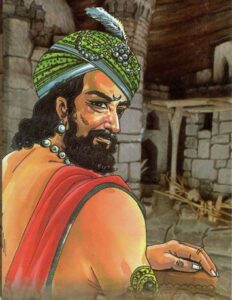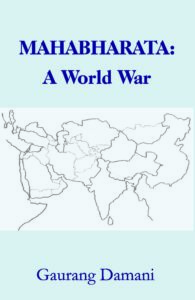 In the epic Mahabharata, Rishi Mandavya experienced pain because of an unfair punishment. He cursed Yamaraja (the demigod of death and justice) to be born on Earth to a Shudra (service-oriented).
In the epic Mahabharata, Rishi Mandavya experienced pain because of an unfair punishment. He cursed Yamaraja (the demigod of death and justice) to be born on Earth to a Shudra (service-oriented).
Hastinapura had no heir to rule the kingdom. Satyavati, the ageing Head of State requested her eldest son Maharishi Vyasa to perform niyoga. Thus, the widowed Queens Ambika and Ambalika gave birth to Dhritarashtra and Pandu. Satyavati begged Vyasa to grant another child. Ambika sent her daasi (maid) to the sage. Before leaving, Vyasa blessed her that she would not remain a Shudra. Thus, it was Yamaraja reborn as Vidura.
Dhritarashtra, Pandu, and Vidura devotedly studied the Veda-s, weaponry, and governance. Vidura, free from kaama (desires) and anger, became an expert in artha-tattva (economics). Dhritarashtra was not made the king being blind, and Pandu was coronated. Vidura, a great adherent of Dharma (moral laws) became the Prime Minister. Bheeshma got daasi-putra Vidura married to King Devaka’s beautiful daughter. They later had many accomplished children.
After Pandu departed to the forest due to a Rishi’s curse, Dhritarashtra became the king. When his wife Gandhari birthed Duryodhana, there were many bad omens. Donkeys brayed, violent winds blew, and there were unexpected fires. Vidura advised abandoning the child but the father refused.
Pandu’s 5 sons and Dhritarashtra’s 100 sons grew up together. The wicked Duryodhana planned to burn the 5 Pandava brothers alive in a laksha-griha. Vidura uncovered this plot through his spies, and informed Yudhishthira in the Mleccha (barbaric) language that nobody could understand. Vidura sent an expert tunnel miner, and arranged a boat to cross River Ganga to escape. The Pandava-s and their mother Kunti spend a long time in hiding. Later, Arjuna won the hand of Draupadi, the beautiful princess of Panchala. Having no choice, Dhritarashtra sent Vidura to Panchala to escort them back to Hastinapura. As per an agreement, the Pandava-s built their city Indraprastha.
During Yudhishthira’s Rajasooya yagnya, Vidura was assigned to distribute gifts to the esteemed guests. Duryodhana received all the invaluable gifts. Soon, a jealous Duryodhana lured Yudhishthira to play the gambling match, against Vidura’s wishes. While Yudhishthira was losing, Vidura advised the delighted blind king to abandon his son. Duryodhana called Vidura a parasite. Vidura replied that his words may be disagreeable but he always wished wealth and fame for the Kaurava-s. He said dishonesty is one of the most frightful doors to hell. When Draupadi was lost, Vidura said that Yudhishthira lost himself before he bet his wife, so the last game was invalid. Duryodhana’s brother Vikarna endorsed this.
At Karna’s suggestion, Dushasana disrobed Draupadi but failed. Vidura announced that a witness remaining silent is censurable, and will face much grief. Still, Bheeshma, Dhritarashtra, Drona, Kripa, and the assembled kings remained quiet.
Duryodhana beckoned Draupadi to sit on his left thigh. Bhima swore to break that thigh, or else he should not get entry into pitru-loka. Vidura lamented that Duryodhana’s sinful comments about a lady meant the Kaurava’s destruction was inevitable. A forest exile was then enforced.
After Pandava’s 13 years exile, Duryodhana refused to return their kingdom. A worried Dhritarashtra confessed to his trustworthy Vidura that he had lost his sleep. Vidura explained that insomnia overtakes a thief, one who has lust, has lost all his wealth, has been unsuccessful, or is attacked by a stronger person. At the king’s request, Vidura explained morality (Vidura niti). Vidura recommended in vain that the king was duty-bound to undo the wrongs done to the Pandava-s.
God Krishna reached Hastinapura to appeal for peace and settle for a mere 5 villages. He met Vidura before meeting others. He refused to eat at Duryodhana’s palace saying his food is not moral. Krishna also declined the proposals of Bheeshma, Drona, Kripa, and others. He ate at the house of Vidura, the righteous son of a daasi. There, Vidura called him the soul residing inside all the beings.
Next day in the assembly, Bheeshma, Drona, and Vidura urged Duryodhana to accept Krishna’s proposal. Instead, the foolish Duryodhana announced that he will capture Krishna. Vidura described how Krishna had subdued Deva-s, Asura-s, and wicked kings. Duryodhana remained adamant. The God of the cosmos smiled. Images of various gods and beings emerged from his divine lustrous body. Krishna gave celestial eyes to Vidura, Bheeshma, Drona, Sanjaya, and the Rishi-s to see this miracle. Krishna calmly departed.
Dhritarashtra invited Vidura for a war planning meeting with Duryodhana and others. Vidura again advised giving Yudhishthira his legitimate share. He suggested to the king, for the good of his clan, to reject his wicked son who disliked Bhagavan Krishna. A furious Duryodhana told his father to throw Vidura, a crooked son of a daasi, out of the palace. Vidura silently left after dropping his bow at the door (indicating his neutrality in the war). Alone, he travelled to many teertha-s across Bhaarata, and returned after the war ended.
Vidura counselled the blind king that the best way to lessen his grief is to not dwell on it. 15 years later, Dhritarashtra, Gandhari, Kunti, Vidura, and Sanjaya took vaanaprastha-ashrama. After another year, the Pandava family visited them. They saw a weakened Vidura living only on air. While Yudhishthira was paying his respects, Vidura’s energy transferred to him and his soul left the body. Maharishi Vyasa remarked that Vidura, a reincarnation of Dharmaraja was now liberated from Rishi Mandavya’s curse.
This narration shows that Yamaraja was reborn to a Shudra who would later change her varna with a sage’s blessings. A daasi-putra studied the Veda-s and weaponry, married a princess, and became the Prime Minister. Later, God Krishna refused to eat with born Kshatriya-s or Brahmana-s, but ate with the virtuous Vidura. Krishna showed his divine form to a daasi-putra and a Suta-putra.
This article is an excerpt from the book ‘Mahabharata: A World War’ by Gaurang Damani. The book is available at Padhega India and other online stores.
This article first appeared on the Hindu Post website.

